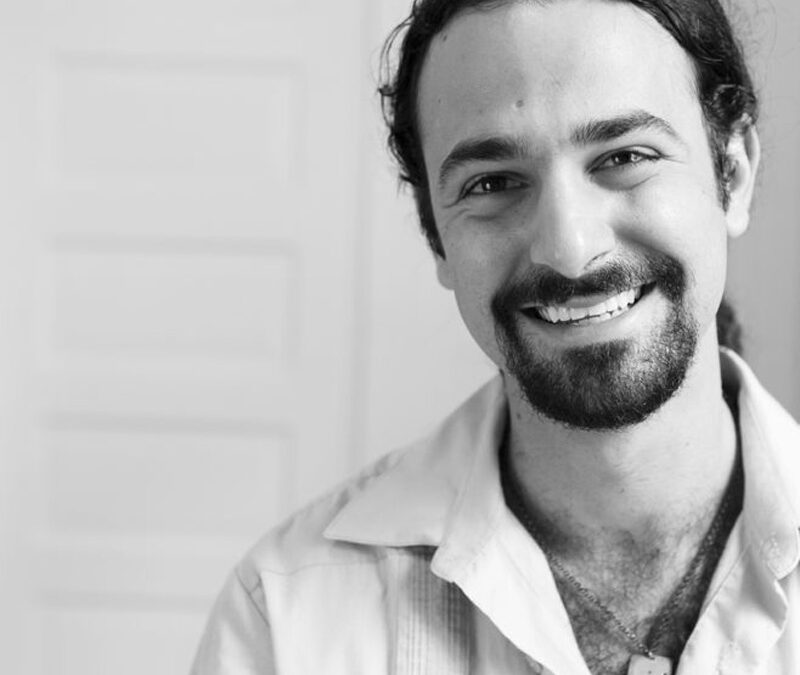The Peauxdunque Ten: A Peauxdunque Interview with Christopher Louis Romaguera
Interview by Susan Kagan
- What about your podunk of Miami inspires you the most?
It’s a city of exiles. Everyone is hustling, working hard, and it does make it hard when people aren’t that friendly on the street in passing, not saying hi, ‘cause you know, they got three jobs and four side-hustles. But despite all that stress, from the literal working too many hours and driving too many hours, to the deeper battles, like trying to figure out if this is the new home for you and your family and the generations to come, there is this beauty, of each neighborhood capturing a bit of a homeland that’s been left. Whether it’s Cuban or Colombian or Haitian or Jamaican or Venezuelan, etc., each neighborhood seems to show who was the predominant exile when it was constructed, or affordable. And you see the ofrendas by the ceibas or smell the fish on Good Friday or what have you, and you realize you have gotten to experience a taste of someone else’s home, right in your own city.
- How does belonging to Peauxdunque help with your writing?
Peauxdunque gives me a community of writers who I respect and admire dearly. I’ve been friends with quite a few of the members before I was “officially” in Peauxdunque, and being able to have a designated time and place where we get to share space and work with friends I love, and with friends whose work I love, is very important and helpful to me. These last couple of years have really hammered home the importance of community, and Peauxdunque is a writing community I feel respected and loved in.
- What are your long-term writing goals?
To write things that truly affect people. To write in a way that is engaging and reachable to everyone, but also to write stories that stick with people, that can be quoted in bars and at barbeques, but that can be written about for school papers or dissected politically, philosophically, etc. And to write stories that love my peoples, but also stories that challenge us.
- What’s the biggest challenge you have with writing?
That I haven’t come to grips with when to stop tinkering with the pieces that I love. And this means I write stories that expand to include too much. I need to learn the lesson that sometimes a short story can just be about a man trying to drink a drug dealer under the table to steal his stash during a hurricane. It doesn’t have to be more than that.
- Is there a common playlist of music you write to? If so, what are the five most prevalent artists?
My playlist is constantly in flux, in motion. Sometimes it’s a lot of movie soundtracks. But if I had to pick five artists that I listen to the most, today (November 17, 2021’s) answer is: Hurray for the Riff Raff, Sam Doores, Nas, Outkast, and Interactivo.
- Whose writing do you most admire among the living and the dead?
Among the living, (and these lists are never fully complete the way you want them to be), I’d go, Kiese Laymon, Maurice Carlos Ruffin, Patricia Engel, and Jesmyn Ward.
Among those who’ve passed: Jose Marti, Pablo Neruda, and Toni Morrison.
- What are your writing quirks?
I love the little routines that surround writing, that help get me into a rhythm, like a basketball player who has to do certain rituals before the jump. I love making my coffee in the morning, either a cortadito con azucar or an iced coffee with oat milk, cinnamon, and cayenne. I love having a clicking pen and a ready notebook on the desk I made with loved ones. I love breaking up the writing day with a run, or an hour of basketball, or walking to the nearest bar and working some more there. And I love pacing in circles and thinking about things when I need to take a break from typing or writing.
- Are you a pantser (writing by the seat of your pants with no outline) or a plotter (writing with a high-level outline of all the plot points) and have you tried the other way?
I think the closest I get to plotting is reading a piece before I go to sleep the night before, and hoping I dream it over and mull it over, and that the story just sort of comes to me in my sleep by the time I wake up. I always believe the process will take me where I want to go as far as writing is concerned.
- If you could live in any fictional reality, which one and why?
I’m going to go with Kiese Laymon’s Long Division. I think the idea of having a world where I can time travel and create a world/text for me and all my peoples, sounds like what I want out of this reality.
- What’s one of your favorite Peauxdunque memories?
Peauxdunque Review’s Issue 1 launch reading, before I was actually “in” Peauxdunque, where I read my piece, “Miami,” in my other home, New Orleans, at a mescaleria. It felt like every moment more and more people I knew and loved showed up. It was one of the last readings my sister has seen in person. When reading that piece, I got the whole crowd to do the clave for me, as I read over it. And then just sipping on mescal afterwards, and then meeting up with some friends who had a reading on the next block over and celebrating with people from both readings, just felt like a really special moment of writing community in New Orleans, and one I haven’t had since.
